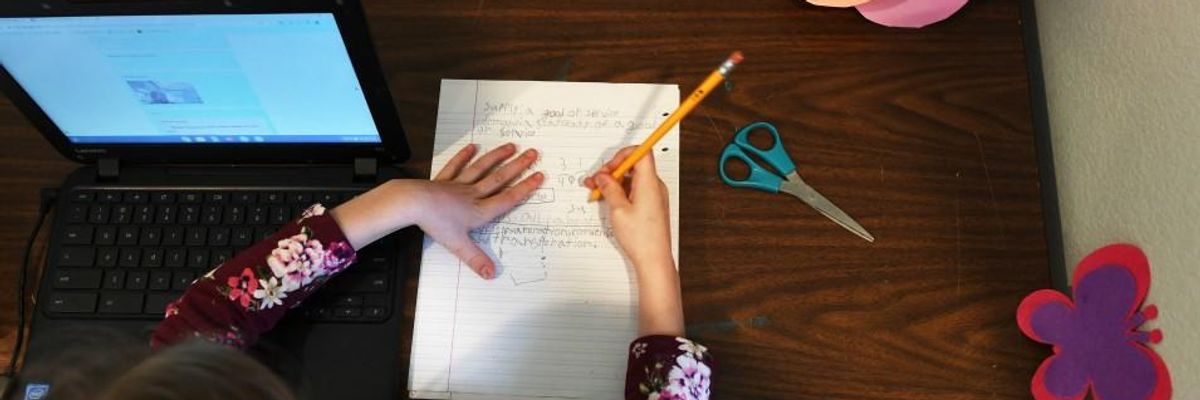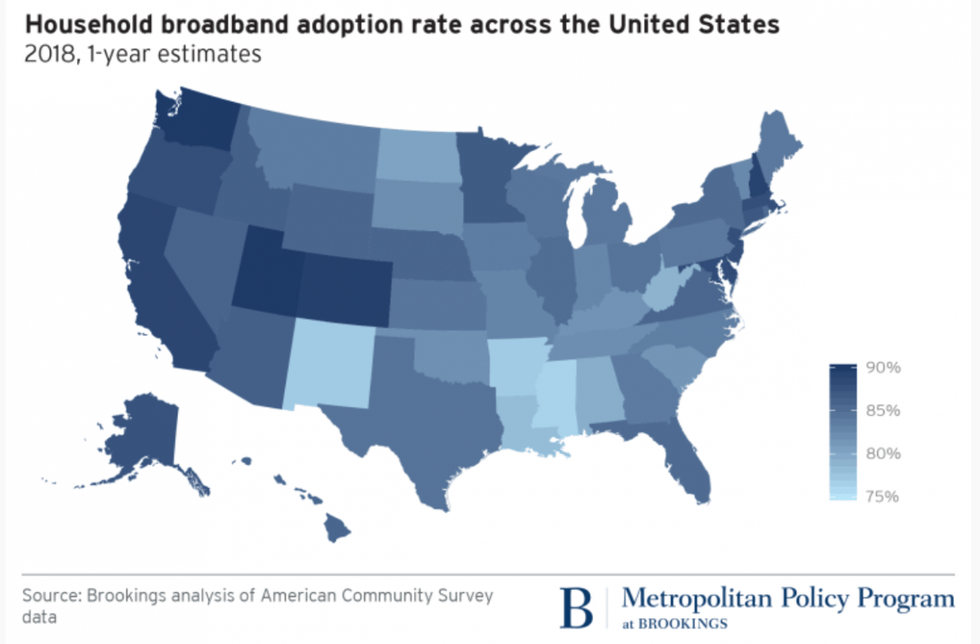

SUBSCRIBE TO OUR FREE NEWSLETTER
Daily news & progressive opinion—funded by the people, not the corporations—delivered straight to your inbox.
5
#000000
#FFFFFF
To donate by check, phone, or other method, see our More Ways to Give page.


Daily news & progressive opinion—funded by the people, not the corporations—delivered straight to your inbox.

Eight-year-old Indi Pineau, a 3rd grader in Jeffco Public Schools, works on doing her first day of online learning in her room at her family's home on March 17, 2020 in Lakewood, Colorado. Jeffco Public Schools implemented a remote learning and work plan where teachers, students, and staff will educate and learn from home with online programs for an unknown period due to COVID-19. (Photo: RJ Sangosti/MediaNews Group/The Denver Post via Getty Images)
Number of Americans that the Federal Communications Commission says lack access to high-speed internet service, a number it calculates by using self-reported data from providers: 21 million
Percent of U.S. residents in urban areas who lack access to high-speed internet, according to the FCC: 2
Percent in rural communities: about 25
According to a recent report from the company Broadband Now, number by which the FCC may be lowballing its broadband access estimates, with rural areas particularly likely to be miscounted: 20 million
Percent by which the FCC may be over-reporting broadband coverage in Arkansas, a state that's 44 percent rural: 23
Percent by which it may be over-reporting coverage in Mississippi, a state that's more than one-half rural: 20
Number of people by which the FCC may be overestimating broadband coverage in North Carolina, a heavily rural state that consequently has turned to other sources of information to figure out which communities are most in need: 500,000
Number of households in a census block that need to have access to high-speed internet service for providers to claim they serve the entire population of that census block: 1
Factor by which families in poor areas in the U.S. are more likely to lack access to high-speed broadband than the wealthiest households: almost 5
Percent-average broadband adoption rate in a typical majority-white U.S. census tract: 83.7
Adoption rate in the average census tract where African Americans make up more than 50 percent of residents: 67.4
Rank of the South among U.S. regions with the lowest rate of broadband adoption: 1
Portion of Americans who live in low-subscription neighborhoods, meaning that broadband is available but fewer than 40 percent of households are connected: nearly 1/4

The average monthly broadband internet bill in the U.S.: $65.14
According to one study, percent broadband prices would have to come down for subscriptions to increase by just 10 percent: about 15
As some communities consider publicly-owned broadband to increase access and affordability, number of states that have passed so-called "preemption laws" banning it or erecting significant roadblocks: 25
Of those 25 states, number in the South: 9*
Amount the telecom industry, which has long lobbied against public broadband, invested in state politics across the country over the past decade: over $174 million
Funding included in the $1 trillion coronavirus stimulus bill passed this week to help narrow the so-called "homework gap" between households with internet connections and equipment and those without it: $0
* Alabama, Arkansas, Florida, Louisiana, North Carolina, South Carolina, Tennessee, Texas, and Virginia.
Trump and Musk are on an unconstitutional rampage, aiming for virtually every corner of the federal government. These two right-wing billionaires are targeting nurses, scientists, teachers, daycare providers, judges, veterans, air traffic controllers, and nuclear safety inspectors. No one is safe. The food stamps program, Social Security, Medicare, and Medicaid are next. It’s an unprecedented disaster and a five-alarm fire, but there will be a reckoning. The people did not vote for this. The American people do not want this dystopian hellscape that hides behind claims of “efficiency.” Still, in reality, it is all a giveaway to corporate interests and the libertarian dreams of far-right oligarchs like Musk. Common Dreams is playing a vital role by reporting day and night on this orgy of corruption and greed, as well as what everyday people can do to organize and fight back. As a people-powered nonprofit news outlet, we cover issues the corporate media never will, but we can only continue with our readers’ support. |
Number of Americans that the Federal Communications Commission says lack access to high-speed internet service, a number it calculates by using self-reported data from providers: 21 million
Percent of U.S. residents in urban areas who lack access to high-speed internet, according to the FCC: 2
Percent in rural communities: about 25
According to a recent report from the company Broadband Now, number by which the FCC may be lowballing its broadband access estimates, with rural areas particularly likely to be miscounted: 20 million
Percent by which the FCC may be over-reporting broadband coverage in Arkansas, a state that's 44 percent rural: 23
Percent by which it may be over-reporting coverage in Mississippi, a state that's more than one-half rural: 20
Number of people by which the FCC may be overestimating broadband coverage in North Carolina, a heavily rural state that consequently has turned to other sources of information to figure out which communities are most in need: 500,000
Number of households in a census block that need to have access to high-speed internet service for providers to claim they serve the entire population of that census block: 1
Factor by which families in poor areas in the U.S. are more likely to lack access to high-speed broadband than the wealthiest households: almost 5
Percent-average broadband adoption rate in a typical majority-white U.S. census tract: 83.7
Adoption rate in the average census tract where African Americans make up more than 50 percent of residents: 67.4
Rank of the South among U.S. regions with the lowest rate of broadband adoption: 1
Portion of Americans who live in low-subscription neighborhoods, meaning that broadband is available but fewer than 40 percent of households are connected: nearly 1/4

The average monthly broadband internet bill in the U.S.: $65.14
According to one study, percent broadband prices would have to come down for subscriptions to increase by just 10 percent: about 15
As some communities consider publicly-owned broadband to increase access and affordability, number of states that have passed so-called "preemption laws" banning it or erecting significant roadblocks: 25
Of those 25 states, number in the South: 9*
Amount the telecom industry, which has long lobbied against public broadband, invested in state politics across the country over the past decade: over $174 million
Funding included in the $1 trillion coronavirus stimulus bill passed this week to help narrow the so-called "homework gap" between households with internet connections and equipment and those without it: $0
* Alabama, Arkansas, Florida, Louisiana, North Carolina, South Carolina, Tennessee, Texas, and Virginia.
Number of Americans that the Federal Communications Commission says lack access to high-speed internet service, a number it calculates by using self-reported data from providers: 21 million
Percent of U.S. residents in urban areas who lack access to high-speed internet, according to the FCC: 2
Percent in rural communities: about 25
According to a recent report from the company Broadband Now, number by which the FCC may be lowballing its broadband access estimates, with rural areas particularly likely to be miscounted: 20 million
Percent by which the FCC may be over-reporting broadband coverage in Arkansas, a state that's 44 percent rural: 23
Percent by which it may be over-reporting coverage in Mississippi, a state that's more than one-half rural: 20
Number of people by which the FCC may be overestimating broadband coverage in North Carolina, a heavily rural state that consequently has turned to other sources of information to figure out which communities are most in need: 500,000
Number of households in a census block that need to have access to high-speed internet service for providers to claim they serve the entire population of that census block: 1
Factor by which families in poor areas in the U.S. are more likely to lack access to high-speed broadband than the wealthiest households: almost 5
Percent-average broadband adoption rate in a typical majority-white U.S. census tract: 83.7
Adoption rate in the average census tract where African Americans make up more than 50 percent of residents: 67.4
Rank of the South among U.S. regions with the lowest rate of broadband adoption: 1
Portion of Americans who live in low-subscription neighborhoods, meaning that broadband is available but fewer than 40 percent of households are connected: nearly 1/4

The average monthly broadband internet bill in the U.S.: $65.14
According to one study, percent broadband prices would have to come down for subscriptions to increase by just 10 percent: about 15
As some communities consider publicly-owned broadband to increase access and affordability, number of states that have passed so-called "preemption laws" banning it or erecting significant roadblocks: 25
Of those 25 states, number in the South: 9*
Amount the telecom industry, which has long lobbied against public broadband, invested in state politics across the country over the past decade: over $174 million
Funding included in the $1 trillion coronavirus stimulus bill passed this week to help narrow the so-called "homework gap" between households with internet connections and equipment and those without it: $0
* Alabama, Arkansas, Florida, Louisiana, North Carolina, South Carolina, Tennessee, Texas, and Virginia.